- Home
- Lilith Saintcrow
Steelflower at Sea Page 3
Steelflower at Sea Read online
Page 3
It beggared belief that a prince of G’maihallan did not know how to swim. If not for shipsick Gavrin disobeying strict orders to stay belowdecks, none would have known the brota had foundered until too late, and little Diyan, disobeying too, would not have plunged into the lashing sea and dragged my s’tarei to the surface with a handy shipscrook. The Vulfentown wharf-rat, sleek as a pirifish or an otter and just as at home among the waves, had brought him to the surface, and I fought the sea and the wreckage as well to get us to the side. Gavrin clung to a trailing net, caught the line that had secured the brota above, and miraculously forgot his guts heaving out through his mouth long enough to haul us from the Lan’ai’s greedy embrace.
The deck spun alarmingly. Lightning sizzle-scorched, a bright silver flash. There was no time to wait for the thunder, not if the battle still raged. Diyan skidded toward me, his dark hair plastered down, my hand shot out and caught his thin arm. “Stay with him!” I yelled, gaining my feet in a graceless lunge. Slip-stumbling across the deck, I arrived just in time to see the second corsair, deck alive with flame despite the driving rain, heel desperately away. Those among the Taryam’s crew who were still fit for battle let loose a torrent of victory cries, and the last hapless pirate who had clambered onto his deck was swiftly dispatched by the Shainakh adjii’s shortblade and tumbled over the side, a loose-jointed doll vanishing into the Lan’ai’s hungry mouth.
I stood, sides heaving, dripping and stinging all over. Hrufel, his face slicked with bright blood, started bellowing to check the rigging, and sailors swarmed to obey. The adjii, turning from the railing with his dark Shainakh eyes ablaze, raised his shortblade and let out a victory yell that managed to pierce the approaching storm with a bright silver note.
Tyaanismir Atyarik was whole and unharmed, helping Janaire from the captain’s deck. He saw me and halted, his face gone soft with shock. Rainak Redfist arrived at my side, giving me a clap on the shoulder that nearly sent me to my knees. “A fine fight!” he brayed. “Eh, lass? I have nae wet me axe on a ship before!”
Lucky. So gods-be-damned lucky. I bent over, my belly deep-griping. I heaved a quantity of seawater onto the deck, laced with a goodly amount of sickening white foam, and managed to stagger back for Darik.
Too late. Atyarik and Janaire were already there, the Gavridar adai’s hands full of Power as she bent over him. It coruscated from her slim fingers, her travel braids knocked askew but her face alight as she poured healing into him. Diyan crouched beside her, staring adoringly at her soft, set expression.
I found I still had my dotani, safe in its sheath, though it would need careful cleaning after this. By all rights, we should not have escaped this lightly.
I shook my head, whipping salt and blood from securely knotted braids. Battle-weariness swamped me, and if not for the sudden sure rasping of instinct along my nerves I might have been too late. A venom-green snake, lying in wait under branches thick with dripping moisture—for a moment I was in the steaming hell of Ha-chua again, two days into the jungle and I had decided to turn back for Hain before my boots rotted off and the snakes, Mother Moon, the snakes—
I tore free of the illusion just in time, my dotani flashing down, ringing as it clove air and rain. Steel will banish many types of witchery, and something inside me twitched, too, throwing off the poison-spell by mere increments so it splashed harmlessly along the wet deck, smoking but unable to keep its virulence under the double assault of seawater and sky-tears.
The windwitch screamed as I descended upon him, his eyes rolling back in his head, the whites full of the staining of vavir-weed. It consumes from the inside out, that dreamy long-stalked herb, and I have heard witches sometimes chew it to gain the future-knowing. Maybe it was why the windwitch was so desperate—it makes you strong, before it eats you—or perhaps we had killed one dear to him in the melee.
Or maybe he simply did not wish to live, hobbled and crippled, slave to the weed or enduring a long agonising death from its lack. His hand jabbed up, hempenwork bracelets clustering both wrists over the blue-black whorls of ink forced under salt-lashed skin. The wind answered, a great gout of seawater foaming over the side, lightning stabbing around the Taryam.
I wrenched his head back, my fingers cramping in wooly, matted hair. The Taryam shuddered between boiling lightning-lashes, thunder blasting and ripping whatever canvas it could, and a great shuddering swell knocked the ship sideways. Another hungry wave sluiced the back half of the ship, nearly dragging him down, and I worked my knife across the windwitch’s throat. A hot spray of blood, his body kicking and flopping uselessly, and I felt the life leave him, an ice-scorch brushing my cheeks and wrists and sodden hair.
Knife-work is close, and dirty. And very, very personal.
I dropped the husk, and straightened. Janaire stared, thrown to her knees, Atyarik at her side, bracing his adai. Darik lay in their arms, pale as death, coughing and his eyes fever-glittering, and stared as if I were a loathsome creature wriggling under a rock.
After all, I had left my wounded s’tarei in the care of strangers, and cut a prisoner’s throat right before them. Diyan, sleek and sodden, examined me with bright interest. Of course, he’d probably seen his fair share of throat-cutting in his time, and he probably understood you do not let a vavir-stained enemy live.
Of all my companions, the boy perhaps understood me best.
The storm’s heaving diminished somewhat. I was right, the windwitch had been urging it on. Had I been a proper adai I might have been able to simply halt him, instead of descending to slitting his gills like a common bandit.
I stared at the three G’mai, and they regarded me in turn. I was no adai, and now they knew it too. Even D’ri did, I could see as much as his mouth fell open, horror and disgust mingling on his bloody, salt-scoured, pale, outright beautiful face.
Too fine for me, no matter what oath he took.
When silence falls inside a sellsword at the end of a battle, none of the outer noises matter so much. I lurched upright, took two steps away from the fresh corpse, and teetered. Across the heaving deck strode Rainak Redfist, his stolid legs adapted with no trouble to riding the sea. He did not look disgusted. He simply strolled toward me, bending when he arrived to pick up the lifeless body, meaning to heave it over the side where the Lan’ai could swallow it and be at peace.
I had more in common with a Skaia’lan barbarian and a Vulfentown wharf-rat than with my own kin.
It was high time I remembered as much.
Prize Freedom More
We limped into Antai a tenday later on the wings of the spent storm, almost bare of canvas and every sailor lean as a Hain hunting hound. Since I’d been a-ship so often, I took my turn with the work, glad to have something to fill my hands and drain my head of everything but line, wind, canvas, and wood. We barely escaped another duo of corsair-ships along the chain of small uninhabited islands sheltering Antai from the south, racing up their jagged shorelines with just barely enough speed. Kesa of the Swallows Moon Inn had done well in recommending Hrufel, for he was as mad as any who roamed the seas and stubborn as a mountain to boot. Not only that, but there was no attempt to relieve any of his passengers of valuables, no matter how the crew forked an avert sign at Janaire or eyed Darik’s fine clothing. Even Diyan was safe, though I am certain one or two of the crew had tastes that ran to young shipwife. Another proverb: there is a marrying man on each ship, said in gutter Shainakh with the syllables for each ship twisted halfway to the term they use for boylovers.
The Vulfentown wharf- rat was my companion as I climbed the rigging, quick and nimble as an adolescent feline. I oiled his hands when they cracked under the harsh conditions and sent him below, but after a few hours of snatched rest he would be at it again, scurrying after anything an adult wasn’t adroit enough to retrieve, knotting rope with deft little fingers, and simply, generally, making himself useful. Gavrin’s shipsickness had vanished after his first taste of open battle and he did his best; Redfist used his b
ulk to good effect as linchpin during some of the trickier moments.
The G’mai...well. They kept away, especially after I took to sleeping in a battle-dead crewman’s hammock instead of their part of the hold. Janaire looked away on those occasions I could not help glancing in her direction, withdrawing behind Atyarik as if she feared my temper. Whenever she came up to deck for a breath of air the crew grumbled, since the sea was angry enough and sight of another witch might roughen her temper even further. D’ri hauled ropes when he was told, and lent what aid he could, and watched me.
At least the ship was small enough he would not fall prey to twinsickness while I avoided him. We were both trapped, and though there is some comfort at not being alone in a cell, most prisoners still prize freedom more.
So, each of us fettered, we scudded over the Lan’ai on the fringes of one storm after another, and had Hrufel not been so adept at his craft we might have ended much further south, maybe even swept out into deeper ocean and dying of thirst on some atoll.
In the end, though, Antai rose on her twelve hills around her gigantic harbor, from crumbling clay of hovel and slum to the garden-cloaked, multicolored stone villas on the heights. Black clouds dropped their curtains behind us, gem-bright lightning tearing rents in the tossing and churning farther out over the depths, but a gleam of setting sun pierced the Lan’ai’s distemper and filled the city with gold. A pall of smokesteam lay cupped in the counting-bowl, a reek of commerce along the quays and docks, counting-houses and open-air markets teeming all day and most of the night as well.
Coin does not sleep, Antai says, unless it has a lazy owner. Laziness is the worst insult that can be flung at a native of the Lan’ai Antaihu, the Westron Rim. Their nobles do not shrink at turning a profit, like those among the Shainakh who consider business a blot upon the family honor. You can buy a title in Antai—or twelve of them, if you prefer, along with sinecures and interests and a crumbling villa certified to be old as the city itself. Or older, depending on whose arse you oil for the right collection of seals and ribbons.
The very southron end of the territory the Anhedrin—for so the natives of the Westron Rim call themselves, a word that means “travelers” in their hinterland tongue—lay claim to ends on the barren, blasted Kavakh peninsula some few days’ journey from the great city itself, where the last Khana Alhai of the Pensari was said to have cut his own throat with a curse rather than be taken captive by a ragtag army of slave-rebels. Antai remembers that it was the great mass of her lowest scum who drove him there, rising in rebellion. Some of Antai’s oldest families claim descent from the Pensari’s pale night-worshipping legions, but not very loudly. Some even say the Clau, those ghost-skinned island folk, are related to them.
The Clau have their own legends and witchery, but they do not share either. Even Kesa did not speak much of her homeland, not even in her bed.
“Never thought I’d see this again,” Redfist said beside me, his odorous bulk looming. He was pale too, though his ruddiness would save him from suspicion of Pensari blood.
“You came through Antai?” My voice cracked from disuse—there had not been much to say, except brief yells warning another sailor of some danger, or of my intentions so they could leave me to my work.
“Aye. Took the Pass south from Karnagh, once I was out of irons.” He glared at the city as if it had personally offended him. “Dunkast never expected some might actually be loyal to their own kin, the bastard.”
I absorbed this. Citynoise bounced over the water, reflecting oddly from a liquid mirror—chantsong from heaving laborers, ringing gongs and bells from the temples, shrieking and bleating from the animal pens, the din of humanity. After so long with merely waves, wind, and our own thoughts, it was an assault, and one I welcomed. The work of landfall would delay the inevitable confrontation with the G’mai. “Where is Karnagh?”
“North. At the throat of the Pass, but first ye have to pass through the demon’s arsehole.” He looked very much as if he wanted to spit, his coppery eyebrows knotting together.
“Demon’s arsehole? Is that like red-eyed bugger?”
That earned me an amused glance. “That was a figure o’speech, lass.”
At least he had not lost his humor.
“Do you ever long for home?” It was the first time I ever asked directly, and perhaps the wrong moment, because he said nothing, simply continued gazing at the hills, the rich merchants’ houses called earthfoam because they were cast to the top of the land-swells. Gulls coasted, their thin piping cries drowned out as we drifted into the distress channel, waiting our turn. Our battered state would be easy enough to spot from shore, a pilot and heaver were already scrambling from one of the outer docks. At least Hrufel’s cargo was safe; he would realize a healthy profit from this voyage even if he had to repair a good bit of canvas and scrape the Taryam’s hull. There was also the last half of the passage fee Kesa had negotiated for us, and I added another ten silver sequins atop it, perhaps because I was exhausted enough to be charitable, and perhaps because his men had treated me no differently than any other sailor. Most of the crew would winter here, I suspected, since the season was already turning.
What I would not have given to be one of them. And yet.
Ammerdah Rikyat had expected to winter in Shaitush. The thought was a pinch in a sore spot.
My luck will turn against me, Kaia!
Hrufel’s adjii bellowed from the captain-deck, and I turned to helping the Taryam dress himself for company.
The Number Makes Him Uneasy
To walk on land after crossing the Lan’ai is...disconcerting. The sea hides in your legs and bones and breath, and the earth pitches under you strangely by not moving at all. Arriving at dusk as a storm threatened from the Shelt meant the inns on the lower slopes were bursting with cutpurses and the like, as well as raucous sailors delayed by tide and wind. Up the hills, then, stepping carefully alongside a cart pulled by an ill-tempered roan nag and holding Diyan, the minstrel—who looked green again—and Janaire, who pulled up the hood of her salt-stained travel cloak and bowed her dark head, sitting on the locked chest containing most of Ammerdahl Rikyat’s blood-gold gift. Atyarik paced on the other side, glaring at any who dared press too closely, Darik followed me, and Redfist brought up the rear of our strange little column. The driver tried to cheat me on the price of cartage, but I swore at him in half-Pesh tradetongue and he sighed, spreading his nimble paws as if to say well, this is Antai, one must try.
Night thickened in every corner, whistles and streetstall calls giving way to lantern-bearers crying their ancient ululating chorus, and we crossed the Atluah—the great sea-curving avenue that bisects Antai from north to south—twice before the packed-close structures began to draw apart, allowing a little air between their walls. Weariness filled every part of me, and more than once I considered sinking down onto the filthy street and simply letting the world pass for a little while.
Consequently, when we arrived at a handsome whitewashed inn with a colonnaded front and supercilious stable-boys, my temper was none too sweet. I almost cuffed one of the brats who scurried out to tell us the inn was full, and stamped up the three steps for the carven front door. The sign bore red grapes and a running white horse, freshly painted every summer, and the doorguard was new—a stocky part-Hain who leveled his much-oiled blackstick across the entrance and eyed me from top to toe with what I am certain he thought was stinging disdain.
It turned to dignified attention when I showed a silver Hain sequin and told him to send for his master, for Kaia Steelflower had returned.
That widened his narrow Hainish eyes, and he waved the stable-brats away from our cart, sending an attendant into the depths of the inn. I considered sitting on the steps, but if I did, I would not rise before I had slept enough, and Thanourt did not take kindly to beggars fouling his precious columns. Real Clau marble, he would preen, at least once every drinking-session. Do you know what that costs?
No doubt he did, down
to the last copper bit. I did not have the heart to tell him that they looked like polished Pesh quarry-blocks. But I am no stonewright, and far be it for a sellsword to rob an innkeeper of his prickly pride.
As if the thought of copper bits had summoned him, a blur of bleached apron and wide black moustache weighted with red clay beads that clacked as he grinned wide and white and vicious appeared. “Ah, so sorry—” he began, bowing, his gaze passing right over me as if I was not one of his regular customers, whenever I passed through Antai.
Of course, I would hardly recognise myself when I came offship after such a passage, but one expects an innkeeper to be a little better at it.
My hold on my temper frayed, but did not snap completely. “Three rooms and a bathing suite, Nansou ak’Thanourt, and our board as well, for at least a sevenday. Or I shall set fire to your inn and melt your marble columns.” My braids were crust-glued to my head, I ached in every bone, and I was abruptly aware that I stank of ship, as no doubt everyone but Janaire did.
A real adai, of course, could use Power to cleanse the travel-weariness away.
“Is that...” He blinked in the dusk, and the doorguard lifted a hastily kindled lanthorn. “By Rheldakh’s Seven Teats, it is you! I shall take the skin off that brat’s back for not telling me—come, come, Kaia, and I will not charge you more than seven silvers a day!”
“Three,” I spat, but I extended my hands and we gripped wrists as friends in that thieving city do—to keep each other from picking their pockets, as the proverb goes. “And don’t forget the bath.”
“Ai, Kaia-hanua, what is that? A giant? Five silver, and copper for every hundredweight the giant eats!”

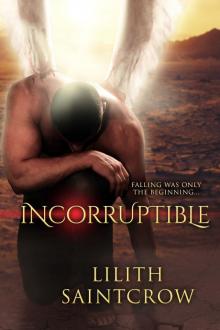 Incorruptible
Incorruptible Finder (The Watchers Book 6)
Finder (The Watchers Book 6) Steelflower in Snow
Steelflower in Snow Dante Valentine
Dante Valentine Redemption Alley-Jill Kismet 3
Redemption Alley-Jill Kismet 3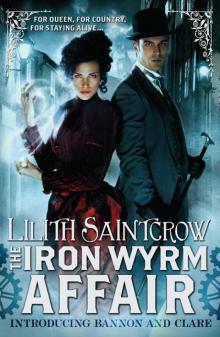 The Iron Wyrm Affair
The Iron Wyrm Affair The Demon's Librarian
The Demon's Librarian The Hedgewitch Queen
The Hedgewitch Queen Redemption Alley
Redemption Alley Flesh Circus
Flesh Circus Saint City Sinners
Saint City Sinners Unfallen
Unfallen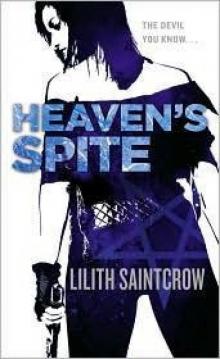 Heaven’s Spite
Heaven’s Spite The Devil s Right Hand
The Devil s Right Hand Roadside Magic
Roadside Magic Steelflower at Sea
Steelflower at Sea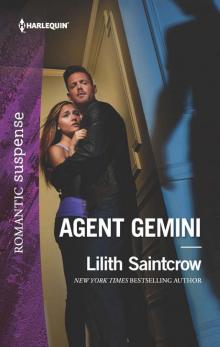 Agent Gemini
Agent Gemini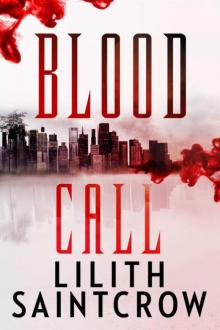 Blood Call
Blood Call Agent Zero
Agent Zero In The Ruins
In The Ruins Atlanta Bound
Atlanta Bound Hunter, Healer
Hunter, Healer Hunter's Prayer
Hunter's Prayer Roadtrip Z_Season 2_In The Ruins
Roadtrip Z_Season 2_In The Ruins Wasteland King
Wasteland King Pack
Pack Flesh Circus - 4
Flesh Circus - 4 Trailer Park Fae
Trailer Park Fae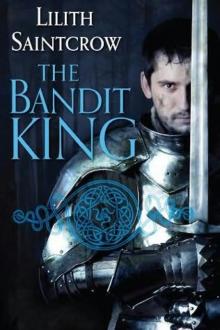 The Bandit King h-2
The Bandit King h-2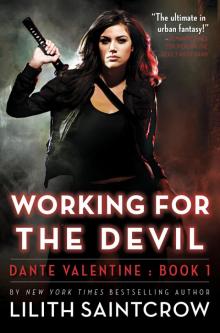 Working for the Devil
Working for the Devil Pocalypse Road
Pocalypse Road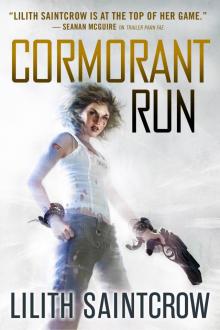 Cormorant Run
Cormorant Run Dante Valentine Book 5 - To Hell and Back
Dante Valentine Book 5 - To Hell and Back Desires, Known
Desires, Known Roadtrip Z (Season 3): Pocalypse Road
Roadtrip Z (Season 3): Pocalypse Road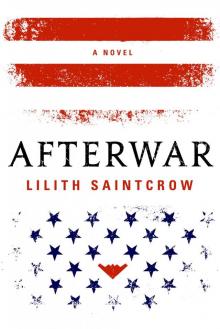 Afterwar
Afterwar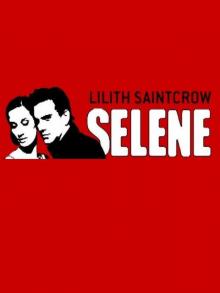 Selene
Selene The Society
The Society The Hedgewitch Queen h-1
The Hedgewitch Queen h-1 Night Shift jk-1
Night Shift jk-1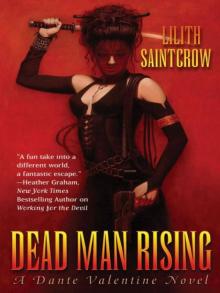 Dead Man Rising
Dead Man Rising Dead Man Rising dv-2
Dead Man Rising dv-2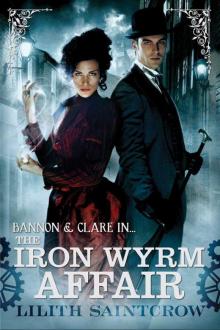 The Iron Wyrm Affair: Bannon and Clare: Book 1
The Iron Wyrm Affair: Bannon and Clare: Book 1 Saint City Sinners dv-4
Saint City Sinners dv-4 Heaven's Spite jk-5
Heaven's Spite jk-5 Beast of Wonder
Beast of Wonder Hunter's Prayer jk-2
Hunter's Prayer jk-2 The Damnation Affair
The Damnation Affair Steelflower
Steelflower The Red Plague Affair: Bannon & Clare: Book Two
The Red Plague Affair: Bannon & Clare: Book Two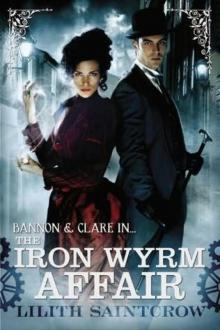 The Iron Wyrm Affair tb&ca-1
The Iron Wyrm Affair tb&ca-1 Flesh Circus jk-4
Flesh Circus jk-4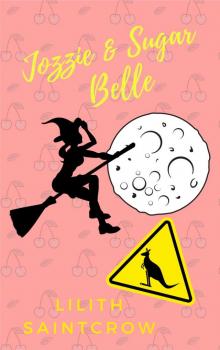 Jozzie & Sugar Belle
Jozzie & Sugar Belle Night Shift
Night Shift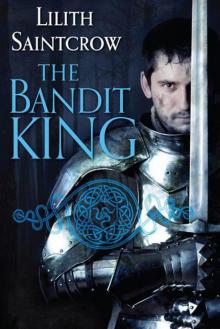 The Bandit King
The Bandit King![Hunter, Healer [Sequel to The Society] Read online](http://i1.bookreadfree.com/i1/04/05/hunter_healer_[sequel_to_the_society]_preview.jpg) Hunter, Healer [Sequel to The Society]
Hunter, Healer [Sequel to The Society] The Devil's Right Hand dv-3
The Devil's Right Hand dv-3 To Hell and Back dv-5
To Hell and Back dv-5 Angel Town
Angel Town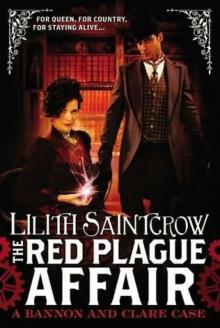 The Red Plague Affair tb&ca-2
The Red Plague Affair tb&ca-2 Redemption Alley jk-3
Redemption Alley jk-3 The Damnation Affair (the bannon & clare affairs)
The Damnation Affair (the bannon & clare affairs) Working for the Devil dv-1
Working for the Devil dv-1